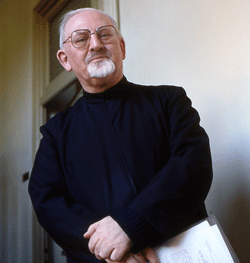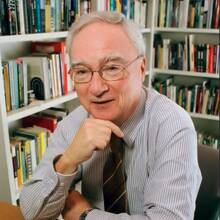Its a good thing we do. The secular press can be understandably baffled at times--as we are, too--by the intricacies of such a meeting. In trying to explain the significance of events to their readers, some journalists have resorted to a preconceived master-story, which provides a context and a framework for otherwise bewildering details. In this case, the old liberal-conservative power struggle serves well, even though it is dreadfully misleading.
Unfortunately, the election of Father Peter-Hans Kolvenbach on the first ballot did not fit the needs of the master-story. During one telephone conversation with a reporter last week, Father Generals beard was cited as a sure sign that he is a liberal, while later that afternoon another reporter wondered if his habitual wearing of the cassock proves that he is the conservative the Vatican was looking for. One widely circulated report cited his early rising and custom of taking long walks through Rome as examples of his "eccentric personal habits." What an odd world when a middle-aged priest is thought of as eccentric for enjoying a long walk through one of the most beautiful cities in the world, but a middle-aged journalist is all but ignored if he chooses to rise at 5 A.M. and jog four miles amid traffic, fumes and muggers before sitting down to a hearty breakfast of unprocessed bran, yogurt and Perrier.
In the search for a story that makes simple, 500-word sense, Father Arrupe, who served as General from 1965 but was incapacitated by a stroke two years ago, has been an unintended but real victim. Some reports described Pope John Pauls address to the delegates at their opening liturgy as a rebuke both to the Society of Jesus and to the General who had led it wisely and courageously through one of the most turbulent eras in the history of the church. Almost as a footnote, if mentioned at all was that touching moment when the pope embraced Father Arrupe and kissed him on both cheeks at the traditional kiss of peace later in the liturgy.
In a subsequent Mass, during a homily prepared for him with his knowledge and approval, Father Arrupe was reported to have confessed his excesses before the delegates began voting for his successor. Again, this conformed to the master-story notion of a liberal-conservative split, with Father Arrupes supposedly repenting his liberal ways and showing his own desire for the congregation to elect "a conservative."
This is the section of his homily that contains the "confession." "I thank the Lord for the great progress which I have witnessed in the Society. Obviously, there would be defects, too-my own, to begin with--but it remains a fact that there has been great progress in personal conversion, in the apostolate, in concern for the poor, for refugees. And special mention must be made of the attitude of loyalty and filial obedience shown toward the church and the Holy Father, particularly in these last years. For all of this, thanks be to God."
Little can or need be added to that sentiment except: Thanks be to God, too, for Father Arrupe.








